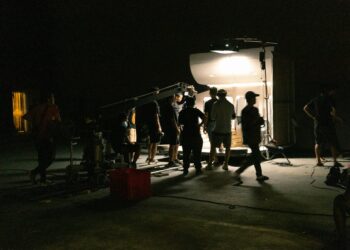Bimbo Ademoye’s Ruse 2, currently streaming on Bimbo Ademoye TV on YouTube, delivers an engaging story that pulls viewers in with relatable themes and layered performances. Featuring Bimbo Ademoye, Kunle Remi, Ehis Perfect, Anthony Wooden, Osareme Inegbenegbor, and others, the 2-hour 25-minute drama is a journey of friendship, ambition, betrayal, and survival.
From the onset, the film shines in its realism. Shalewa constantly reminding Mabel about her grant application, Mabel’s small wins with business orders, and even the struggles of Derrick as a startup owner echo the everyday struggles of many Nigerians. This relatability is one of the movie’s strongest points.
However, the story isn’t without cracks. While Shalewa emerges as the true backbone of the film—supportive, loyal, and tireless—Mabel, on the other hand, is portrayed as overly laid-back, to the point where her laziness lands her in deeper chaos. This characterization feels exaggerated, almost frustrating, especially in contrast to Shalewa’s drive.

The love angle with Anthony also leaves room for criticism. Though his cunningness and manipulative schemes were well-written, Mabel gave in far too easily. The rushed nature of their relationship weakened what could have been a more powerful exploration of how women often get drawn into toxic partnerships. It seemed unrealistic that a supposedly smart, hardworking woman could be swayed so quickly, which undercut the otherwise empowering message of the story.
Another sticking point is the film’s reliance on certain reminders—like Mabel needing to register with FADCA. While the detail added a touch of realism, the repetition came across as heavy-handed, distracting from the flow of the story.
That said, the film redeems itself through its layered storytelling. The surprise reappearance of Kabiru was handled brilliantly, and the eventual climax—bringing together Anthony, his daughter’s drama, Omoye, and Ramot—was well executed without losing coherence.
The film’s greatest lesson lies in its depiction of persistence—how rivals, particularly in women’s lives, will stop at nothing to disrupt their progress. Anthony’s plot to infiltrate Mabel’s life mirrors the reality of manipulative men who thrive by exploiting women’s hard work.
Ruse 2 deserves praise for its strong depiction of female friendship. Shalewa and Mabel’s on-screen sisterhood is refreshing, showing the importance of supportive, non-judgmental girlfriends who push each other toward success.
Despite its brilliance, Ruse 2 falters slightly in character depth and pacing. Mabel’s quick submission to Anthony and her sluggishness in pursuing her goals make her less compelling compared to Shalewa. For a story so invested in portraying women’s resilience, this imbalance takes away some of the intended impact.
Final Verdict: A well-crafted film with heartfelt storytelling and brilliant performances, but one that could have been stronger if it gave Mabel more agency and avoided over-simplifying her flaws.

















